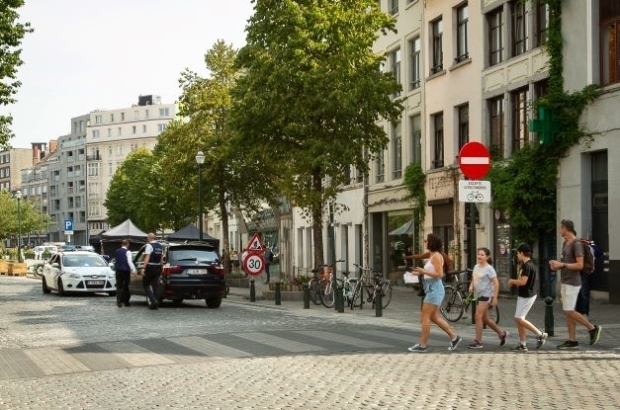- Daily & Weekly newsletters
- Buy & download The Bulletin
- Comment on our articles
Brussels mobility plan is saving Stib passengers time, says minister
Brussels mobility plan Good Move is working, according to mobility minister Elke Van den Brandt (Groen), and data from the capital’s public transport operator Stib seems to support that claim.
Bus and tram lines are running more smoothly in both the Pentagon area and in Schaerbeek, saving passengers several minutes on their commutes.
Stib said that after an initial bumpy start (which was generally expected) improvements made in relation to Good Move have had a positive impact on the journey times of several of its lines, especially during rush hours.
The first assessment, conducted six months after the introduction of the first Good Move adjustments, is positive for public transport, citing improvement in terms of speed and regularity.
The situation will continue to evolve in the coming months, thanks in particular to the constant change in the habits of certain motorists, Stib said.
The company gave some examples: bus line 46 between Porte d'Anderlecht and Yser - which saw 326,000 passengers in February - is one minute faster in the morning rush hour and four to five minutes quicker in the evening rush hour.
In Schaerbeek, trams 25 and 62 between Côteaux and Lefrancq are now 1.5 minutes faster in the evening rush hour. The situation is less clear-cut at this time for bus lines running through the centre of Schaarbeek or along Avenue Chazal, according to Stib.
“Six months after the introduction, the first results confirm the success of the Good Move plan's low-traffic neighbourhoods,” said minister Van den Brandt in a reaction to the news.
“We see that with relatively simple and very inexpensive measures, such as reducing the pressure of car traffic and creating traffic lanes for public transport, we can make historic progress in terms of our public transport traffic situation.”
The mobility plan still faces backlash from a number of people, including the MR party which bemoans its €6.5 million cost, saying that the bill will at least double. And car owners complain that cyclists, public transit, pedestrians and green-transit (non polluting micro-transit like eclectic scooters) are being prioritised.
But Good Move was created to tackle Brussels’ deplorable air pollution and traffic congestion, which is among the worst when it comes to European capitals.
“We want everyone to be able to move around comfortably, quickly and safely, and to do that we have to offer alternatives,” Van den Brandt said.
“At the moment many people are stuck in traffic jams. The traffic plan aims in particular to adapt junctions, to give priority to trams and, for hundreds of thousands of travellers, there is a gain in time, regularity and reliability in public transport.
"The implementation is difficult and a debate is needed. It's like quitting smoking: it's difficult at the beginning and after six months you see the results, the city breathes.”
Van den Brandt noted less car traffic in the city centre and more people cycling or walking.
“Moreover, the city is very lively, the restaurants are packed,” Van den Brandt said. “I thank the commuters who come by train.”
Nevertheless, Van den Brandt points out that despite a 20% reduction in vehicle traffic and less traffic jams, Brussels is not yet among the top cities in terms of accessibility for all modes of transport.
“We must continue to invest so that everyone can travel differently. Public transport is the backbone of mobility in Brussels,” said Van den Brandt.
But people remain in opposition to the changes, often derailing public meetings by jeering and booing. Threats of violence were even directed to ministers.
Even when Good Move is not on a council’s agenda, protestors arrive with signs and shout at ministers as they take their seats. When council members asked people to respect a minute of silence to remember victims of the earthquakes in Turkey and Syria, that silence was filled with loud protesting.
“The last municipal councils were unbearable or even impossible – interruptions, insults, shouting,” said Cécile Jodogne (Défi), mayor of Schaerbeek.
Sessions were forced to adjourn after enough council members decided they could not continue to withstand it, meaning nothing was done. Journalists had difficulty hearing any of the attempts to debate issues actually on the agenda.
“A municipal council is just the heart of local democracy,” said Jodogne, who has called for calm at these gatherings.
“Elected representatives should be able to debate and the public should be able to be present but not intervene. This is a problem I feel strongly about.
"This issue runs parallel to the polarisation in society, which is heavily focused on mobility policy in Brussels.
"That polarisation is fuelled by social media and unleashes behaviour that makes it impossible for local democracy to function.”



















